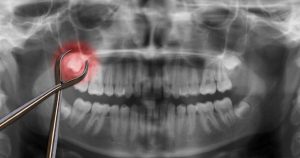
When it comes to wisdom teeth removal, there’s a lot of information floating around out in the world. It can be hard to know what is accurate, or how that information applies to you or your child, and what is most appropriate when in regard to wisdom teeth. Our staff at Ocoee Oral Surgery is here to help answer any questions you might have pertaining to wisdom teeth removal or oral surgery, but in the meantime, here are some things to consider.
- CHECK IN. Between ages 16 and 19, have your dentist check the status of your wisdom teeth. How many do you have? Are they growing in? Are they impacted? Are they causing any pain or movement for other teeth?
- PAIN ASSESSMENT. If your wisdom teeth are causing you any pain, you’ll definitely want to see an oral surgeon to discuss wisdom teeth removal.
- CROWDING TEETH. If your wisdom teeth begin to erupt they can cause movement for the other teeth in your mouth, particularly if you have a small mouth and there isn’t ample room for them to come in smoothly. This can be problematic for obvious reasons, especially if you’ve spent time and resources with any orthodontic procedures to straighten the teeth.
- OVER 30? If you’re over the age of 30, and you’ve never had any issues with your wisdom teeth, you may be in the clear.

If you are going to get your wisdom teeth extracted, you likely have a lot of questions and things to consider before you schedule your oral surgery. Below are a few FAQs about wisdom teeth and wisdom teeth removal you may find helpful.
Q: When is the best time to have wisdom teeth removed?
A: Lots of dentists and oral surgeons agree that it’s best to have wisdom teeth removed before the age of 20. The reasoning behind this is two fold. For one thing, when you’re younger, you tend to heal faster and have less complications with surgeries. For another, when you’re young the roots and bones of your teeth are softer and not fully formed making for an easier extraction.
Q: What causes problems with wisdom teeth?
A: Wisdom teeth can be problematic for many reasons. Your mouth may not have enough room to accommodate these extra teeth, and they may become impacted or unable to break through the gums. Impacted wisdom teeth can create painful, swollen pockets in the gums and even lead to infection.
Wisdom teeth that do fully erupt can cause issues with crowding, and are often susceptible to cavities or gum disease to surrounding gum tissue because they can be hard to adequately clean.
Q: What are the risks of undergoing a wisdom teeth removal procedure?
A: After having your wisdom teeth removed, you may experience discomfort, pain and swelling in the gums, excessive bleeding, slow healing gums, or dry socket, which occurs when the blood clot that protects the tooth socket becomes dislodged too soon.
You may also run into issues with jaw function, damage to other teeth or dental work, like crowns or bridges, existing near the extraction area. That said, all these issues are uncommon, and it is much more likely that you’ll have a complication-free oral surgery.
Q: Will I be sedated or under anesthesia for the wisdom teeth removal procedure?
A: The patient having wisdom teeth removed will be provided with a local anesthetic to numb the affected area. Some scenarios lend themselves well to other options for anesthesia, based on patient needs and recommendations of the surgeon. Your oral surgeon at Ocoee Oral Surgery will discuss options with you prior to your surgery.
Q: How long does it take to recover from wisdom teeth removal?
A: Recovery after wisdom teeth removal can take up to two weeks. During that period of time you may experience some minor pain and discomfort as well as swelling, but these symptoms will improve day by day. Be sure to closely follow post-op instructions provided by your oral surgeon for the best results and smoothest recovery.
If you have any additional questions or concerns, or you’re ready to schedule your surgery, contact our team at Ocoee Oral Surgery. We’ll take great care of you.




